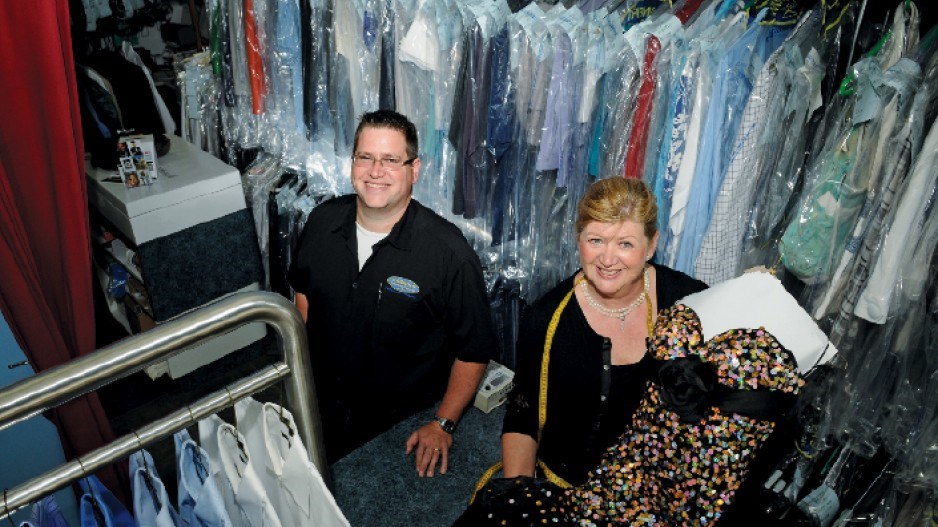Making decisions at Delta-based Wagner’s European Fabricare is a lot less complicated for Elisabeth Wagner and her son Frank compared to the old days of multiple partners in their German family business.
“If one of us has an idea, then we talk about it to see if it’s a good idea and whether to pursue it,” Elisabeth told Business in Vancouver. “Then it’s either a go or a no-go.”
When Elisabeth’s husband, Hans-Karl, died in 1989, his family had been operating in Germany since 1841. Three generations had built Wagner Reinigung into a thriving enterprise with 50 people, running four full-service dry-cleaning outlets plus 130 drop-off locations in northern Bavaria.
But three generations meant many Wagner family members had a slice of the company and the patriarch’s death prompted issues about its direction. That led to winding up the business in 1993.
And that led Elisabeth and Frank, her eldest son, to look for a fresh start.
“I needed enough water between my in-law family and us,” said Elisabeth with a laugh.
A new start
In 1995, she moved to B.C., where she had vacationed, and bought the Check-Mate Dry Cleaning shop in Tsawwassen, in the southwest corner of the Municipality of Delta.
Frank, then 22, followed in 1997 after a three-year dry-cleaning apprenticeship and bought Minato Village Cleaners in Steveston.
Together they formed Wagner Holdings Ltd. and doubled the stores’ revenue within three years.
In 2000, they opened an outlet in the Tilbury area of Ladner, also part of Delta, which included a warehouse for fire-and-flood fabric restoration work that has grown to 8,000 square feet. They sold the Steveston shop in 2001.
“The business has dramatically changed in 12 years,” Frank said. Now 75% of the business is wholesale restoration for insurance companies. About 25 people work in the two locations.
Most decisions are made between mother and son. “Sometimes we involve other staff,” Elisabeth said.
Frank said he prefers the simplicity of working things out with his mother and not other family members, such as his two younger brothers who also moved here.
“I’m glad my brothers are not involved in the business,” said Frank, who added they sometimes pitch in when things get hectic.
The Wagners insist they don’t seriously disagree.
“We have never had a strong disagreement,” said Frank. “It takes a bit of patience and some listening.”
Said Elisabeth: “We have never had a problem working together and agreeing. Somehow we’ve found a decision without running into problems.”
Elisabeth runs the dry-cleaning shop at Tsawwassen Town Centre Mall, and Frank manages the Tilbury shop and warehouse.
“We’ve made it so that each has his part in the business, his responsibilities,” said Elisabeth. “So that makes it easier to decide.”
In the last few months they’ve flipped the executive and ownership positions so that Frank is now president and 60% owner and his mother is vice-president with 40%.
“I think it’s about time for me to step back a little bit, getting toward retirement,” she said.
Frank said he knows of other family businesses where the father has total power and the younger generation doesn’t get the opportunity to make decisions.
“I find that very restrictive. At the end of the day, you learn from your mistakes.”
Consultant Chris Obst, principal and management coach at Burnaby’s Jump Results, said often the family patriarch, who probably started the business, has always run it the same way and can’t let go of decision making.
“You end up frustrating and alienating that next generation who have made a decision to go into the family business and said no to other opportunities.”
In contrast, he said, the Wagners have communicated well throughout the process.
“They did a flip of the power in terms of the ownership structure and who’s got the heavier title. All those things are really healthy for the business.”
Obst said the Wagners’ model of partnership can work well.
“Two is an interesting number because there’s no one to break a tie. In a way it forces you to see each other’s perspective.”
On the other hand, Obst said, families shouldn’t be discouraged from having several members at the table because more minds can mean more creativity.
“It does get more challenging. The way they need to handle that is to have a good mechanism … for everyone’s voice to be heard.” •




